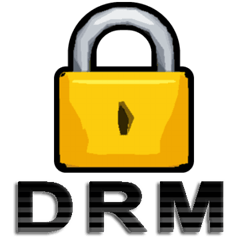 What happens to your digital media titles when the digital media store goes out of business? The Atlantic has a thoughtful piece on this that isn’t quite as thoughtful as its author, The Atlantic staff writer Adrienne LaFrance, seems to think.
What happens to your digital media titles when the digital media store goes out of business? The Atlantic has a thoughtful piece on this that isn’t quite as thoughtful as its author, The Atlantic staff writer Adrienne LaFrance, seems to think.
The central thrust of the article is that publisher, recording label, or movie studio DRM and license terms restrict us from backing up the digital media we purchase, which can lead to problems if a media provider goes out of business. This is not exactly anything new to TeleRead readers, of course. We’ve witnessed the passing of many, many digital media stores or DRM formats (such as Yahoo, Google, Wal-Mart, Embiid, Fictionwise and eReader, JManga, Microsoft, and Microsoft again) and we mostly know how to deal with that sort of thing when it happens.
But LaFrance seems to be a bit more sketchy on the details than she ought to be for someone writing in this field.
For starters, she opens with a look at digital music as opposed to physical music:
“In the good old days, you purchased a CD, which meant that you owned the medium outright and had an authorized copy that you could do anything you liked with, subject to copyright,” said Dan Hunter, the dean of Swinburne Law School. “For example, you could give it away to a friend, or resell it, or whatever. These days we live in a world where we generally license copyright content, like games and music. This means you’re given a limited right to do things with the content—generally this is limited to playing it on a small number of devices—and you definitely can’t resell the content or even give it away. You haven’t really bought the song, you’ve bought a contract to play the thing for a while.”
Except…nobody’s sold digital music with DRM on it for years. When Apple went DRM-free, most of a decade ago, it automatically upgraded nearly every album I’d ever bought from iTunes to DRM-free versions. If Apple (or Amazon or Google) suddenly went out of business tomorrow, I could continue to play nearly every song I bought from iTunes (or Amazon or Google) to my heart’s content, contract or no contract—or, for that matter, upload them to my lockers on rival services, like Amazon Prime or Google Play Music. (Only a couple of albums somehow got passed over in the upgrade, and I’ve since replaced those by other means.)
Then there’s the problem with digital movie purchases:
In order to keep a film in your collection watchable, there’s a constellation of pieces that must be in place: The software that streams the video has to work, the devices you want to use to run that software have to remain compatible with it, and the film itself has to be accessible on that software. None of these things is guaranteed. The films you buy could already, at any time, automatically disappear from your Instant collection. (Again, that’s right there in the Amazon service terms.)
This is a valid issue, I’ll agree. And unlike e-books (more on which later), digital movie purchases take up a lot of space, so you can’t just store them in the cloud. So, simple solution: I don’t buy any commercial digital movies. DVDs and Blu-rays don’t cost all that much more. If I should want to watch them on a digital device for some reason, well, the DRM on them is understood and can be cracked, so they can easily be ripped and converted. (If I didn’t mind breaking the law, at least, which I’m not saying I would ever do.)
The only commercial digital copies of movies I “own” came bundled with Disney- or Ultraviolet-enabled discs that let me request the digital copies free. But even though those services also offer digital movies for stand-alone purchase, you won’t see me spending good money on one of those.
And then there’s the “problem” with streaming subscriptions:
For streaming purchases, the unfortunate fate of one’s collection is pretty straightforward: “Let’s imagine Amazon goes out of business,” said Siva Vaidhyanathan, a media studies professor at the University of Virginia. “In the case of streaming videos, yeah, you just lose it. It’s just not stored locally.”
Yeah, so? If you subscribe to cable television, you don’t “own” the shows you receive from that, either. If you want to “own” (or even own without the scare quotes) something, you buy that particular something, rather than buy access to a service that just lets you watch that something at any time. It’s not as if you’re paying them enough money to let you keep everything.
I’m honestly surprised she didn’t also bring up the fact that streaming services like Netflix are always dropping old licenses and buying new ones since they can’t afford to license everything all the time. What’s your recourse if a movie or show you were watching leaves a streaming service? Well, gee, guess you’ll just have to shell out a little cash and actually buy it. What an imposition!
But the real gem—the absolute zenith of the article’s inanity—comes in this paragraph:
Even in the realm of personal collections, the changing media landscape has implications beyond movies and music, too. “If Amazon were to go out of business, all of my Kindle books would be inaccessible [because] Kindle books are tethered to Kindle software,” Vaidhyanathan said. He suspects that if Amazon were to go under, hackers would quickly figure out how to unlock the Kindle format, and hopefully salvage materials as PDFs or plain text that way. “It might end up completely liberating that content, which of course, would drive publishers crazy,” he said.
Wait, what? “Hackers would quickly figure out…”? Where has LaFrance—and, for that matter, Vaidhyanathan, who is ostensibly an academic speaking within his area of expertise—been for the last fifteen years?
The only e-book DRM format that I know of that wasn’t permanently broken shortly after its original release was iBooks—and that’s only because Apple tends to be dogmatic about patching against DRM hacks as they happen and, given that relatively few people even bother buying commercial iBooks anyway (and almost everything they sell is also available in more-easily-cracked formats), the hackers probably decided it wasn’t worth keeping up the effort. A number of people habitually crack and back up their Kindle e-book purchases as a matter of course—as they did for the other DRMed e-books they bought before the Kindle even came along. I know of people who still have every e-book they ever bought from Peanut Press and Fictionwise since the late 1990s in their Calibre libraries in the Dropbox cloud, including the ones Barnes & Noble didn’t port over to the Nook system when it shut down those stores. How many people still own every paper book they bought since the late 1990s in as-good-as-new condition?
Oh, and they don’t have to “salvage” those e-books “as PDFs or plain text,” either. Many e-book-reading applications can easily deal with DRM-free Mobipocket format, which is what Kindle is if you unlock it (with the exception of a relative few titles that use one of Amazon’s new vector-drawn formats). And Calibre can convert it to any other format (including, yes, PDF or plain text if you want). Seriously, where does The Atlantic get these people?
And I don’t know of too many publishers who will admit to having been “driven crazy” by this dire strait. Indeed, the ease with which DRM has been cracked means that people can even liberate and back up e-books they check out from public libraries, which they didn’t even pay for, which ought to drive publishers berserk if anything would. But I don’t recall seeing much in the way of publisher complaints about even that circumstance. It’s as if everyone is happily pretending that the emperor actually has clothes on.
I will grant that the average person would have trouble with this—the sort of person who is so un-technical that they’ll happily pay money to download an e-book that they could simply copy over from their computer for free. But there are always people out there on the Internet who will be glad to help that sort. And yes, the fact that cracking DRM is against the law as it now stands is also a problem, but given that there’s no way to catch someone breaking DRM for their personal use in the privacy of their own home, the law is effectively toothless against anyone except firms who try to do it commercially. But LaFrance at The Atlantic seems blissfully unaware that it’s even possible at all.
At The Digital Reader, Nate doesn’t trifle with these flaws, but notes that the overall problem inherent in DRM is one that anyone who’s been paying attention has known about since the first DRMed computer games showed up decades ago. This is why it’s so important to be able to crack DRM—and happily, DRM hackers continue to oblige us on that front. On The Passive Voice, Passive Guy points out that properly-backed-up digital media can outlast damage-prone physical goods (and the lively discussion that follows re-emphasizes the point). It’s puzzling that The Atlantic doesn’t seem aware of these issues.
(Time stamp changed—so this post is at or near the top of the home page during a peak traffic period. – D.R.)


































I was reading the article and my thought was that every time a shop was going out of business, people were given advance warning and they could download their purchases or if a new company bought out the old company, they would transfer the databases over, so that you could continue viewing your purchases.
Complete non-story
If someone as large as Amazon ever went bust, their customer base would be worth an incredible amount of money and there would be a large number of business ventures wanting to grab that market share. One of the things they would need to do is to make the transition from Amazon to the new venture as smooth and stress free as possible. I just can’t see this being an issue in this day and age
@Hayden: Thanks, but this issue isn’t a mere abstraction for me. Despite the warnings, I lost a few Fictionwise books after B&N bought out FW. Perhaps I could have fixed the problem, but fortunately the number of titles involved was very small. And I just ran out of time. Should Amazon go out of business or be taken over, who knows what will happen? This is like nuclear war. You don’t count on a mushroom rising over New York, but even a slight chance of that happening can be pretty scary.
Chris, for the new Amazon formatted books, if you [edited out], they come as […] so are not a problem to remove DRM..
Publisher’s note: Because of the DMCA’s anti-circumvention provisions, we can’t share DRM removal tips, so I had to edit out Mary’s very well intended advice. My apologies to her! Of course, this is all the more indication of the damage that DRM does—not just to ownership rights but also to freedom of speech. Some other sites will share removal tips. But I wouldn’t put it past Washington to crack down on them in time—thanks to generous campaign donations from Hollywood and the other usual suspects. After all, D.C. is corrupt enough to try to conceal the details of a major proposed trade agreement from the public. And sure enough, the copyright lobby is among the special interests the agreement favors. – David
Digital media is also fraught with host of legal issues that don’t exist with physical objects such as print books. It isn’t just if the company will stay around. In what sense to those who buy a digital item own it as opposed to having access to it only as long as they live, a particular Amazon or iTunes account is kept active, or they technology supports playing it?
If I recall correctly, NASA discovered that it had no readable copies of much of the data sent back in the 1970s from its Mars landers. It was only able to recover that data because one NASA engineer, defying the rules, had printed out that data and stored it on stacks of paper in his garage.
I’m less concerned about DRM then many other users. I don’t think it greatly serves it’s intended purpose (preventIng “illegal” sharing) and it probably adds costs to the bottom line. But I’m not going to skip buying something just because it has DRM.
If Amazon were (however unlikely) to go bust and my Kindle purchases with DRM went kaput, I would very peeved, and might shake my fists and curse at the business Gods, then get over it and crack the DRM.
It would be nice if publishers did away with DRM, but for me it’s not an issue to loose sleep over.